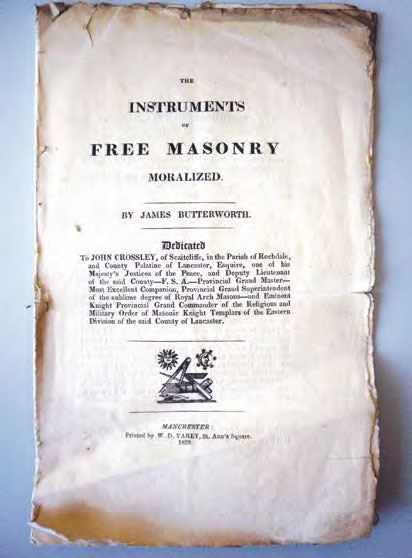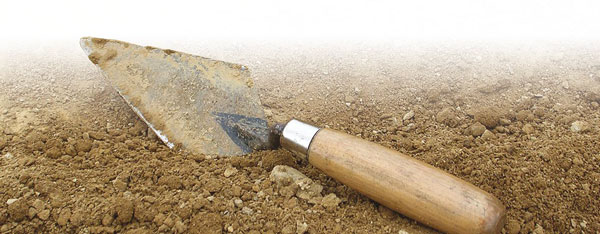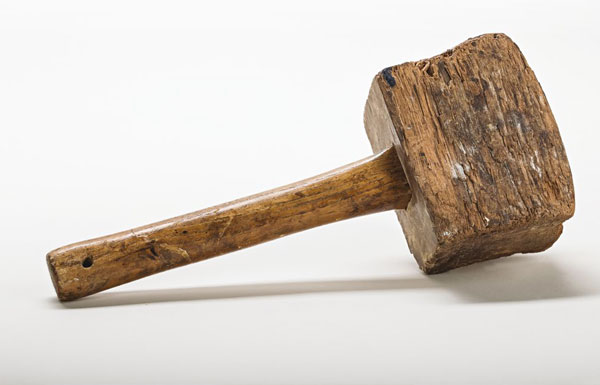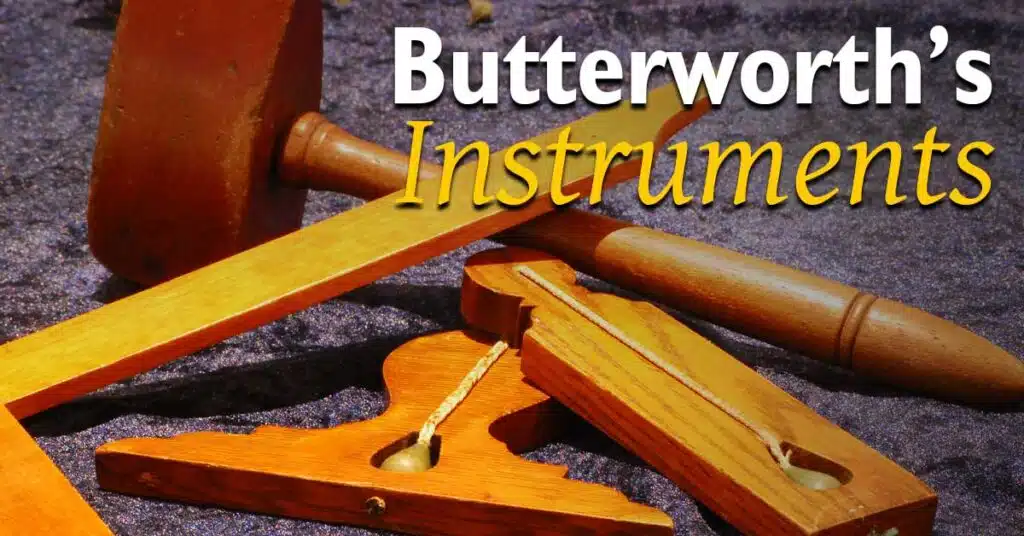The Instruments of Freemasonry Moralized is a small pamphlet written by Mancunian James Butterworth, first published in 1801 and later in 1827 and 1829. Bro Neil Wynes Morse presents the first part of his research paper on the book.
The pamphlet gives an explanation of the Working Tools as tools of moral learning; however, the Tools mentioned are not those normally associated with current practice. One major difference is the inclusion of a hammer.
The document
The following details taken from the bibliography [pp128–132] appended to the biographical essay by Giles Shaw on “James Butterworth, of Oldham” in the Transactions of the Lancashire and Cheshire Antiquarian Society [Vol. XXVI – 1908.]
The Instruments of Freemasonry Moralized. By John Butterworth. Manchester: printed for the author, by G. Bancks, corner of St. Ann’s Square, 1801. 12mo, pp. 24
A History and Description of the Towns and Parishes of Stockport, Ashtonunder Lyne, Mottram, Longdendale, and Glossop, with some Memoirs of the late F. D. Anstey, Esq., of Dukinfield, and Extracts from his Poems. With an elegy to his memory. By James Butterworth. Manchester: printed by W. D. Varey, St. Ann’s Square. 1827. 8vo, pp. 375, 116, viii.
[Also containing the following title pages to the separate sections: Some Memoirs of the late Francis Dukinfield Astley, Esq., with extracts from his Poems, and an elegy to his memory. By James Butterworth. Manchester: printed by W. D. Varey, St. Ann’s Square, 1828. 8vo, pp. 116, viii. (the Memoirs of Astley are sometimes found as a separate work.]
The Instruments of Free Masonry Moralized. By James Butterworth. Dedicated to John Crossley, of Scaitcliffe, in the Parish of Rochdale. Manchester: printed by W. D. Varey, St. Ann’s Square, 1829. 8vo, pp. 8.
A thorough search of library catalogues, masonic and otherwise, has failed to find any copies outside of the Manchester area. The Oldham Archives holds one copy of the first edition and three copies of the second edition.
The Masonic Special Collection of the Library of Manchester University holds one example of each of the second and third editions. The University’s copies were originally part of the Library of the Manchester Association for Masonic Research.
It is from the third state that the following transcription is taken. All spelling, grammar and punctuation is as in the original.
The Instruments of Freemasonry Moralized
Those different kinds of Instruments which we of this ancient order are in the practice of displaying, serve as a sort of memento to direct us in that line of conduct which we ought at all times, (as far as lies in our power,) invariably to pursue.

The Instruments of Freemasonry Moralized by Mancunian James Butterworth
The Rule
This serves, (or ought so to do) to bring to our recollection the undeviating observance of the Gospel of our great Master and Redeemer, according to the tenets contained therein, in which Divine Rule, viz. the Revelation of the Almighty’s will, we ought to press onward with fervent zeal, neither deviating from one side or the other, for the sake of gratifying any of our sensual propensities, and thereby diverting us from the direct line of conduct chalked out for us in the Divine precepts which he not only inculcated, but uniformly practised. It forbids us to listen, lest we be drawn into the least curvilinear direction, to the “voice of the charmer, charm he never so wisely,” to avoid as much as possible every temptation, either of a carnal kind or otherwise, but hold to our course rejoicing; not to be warped aside either from his religious doctrine, or that true system of morality that he so plainly laid down for us, as an eternal guidance for our steps. And as politics (generally so called) is often preached up for self interested motives, he enjoins us not to meddle therewith, but to “render to Cæsar the things that are Cæsar’s, and to God, the things that are God’s.
The Line
Our heavenly Grand Master, the MESSIAS, left us a GOLDEN RULE, whereby to regulate the future works of all succeeding generations, especially those of his true workmen; he also appointed Stewards or Wardens, to assist and instruct the younger or junior branches of his workmen; and if they saw them deviating from that line, to advise and admonish them from time to time to abide strictly by the same, even that line which he had left them as an eternal guide. This line teaches us to avoid all sorts of equivocation, or what is commonly called double-dealing, both in our discourse and actions. It is a line which, if we unremittingly pursue, will lead us up to the summit of that immortal structure, where dwelleth in fulness of glory, the supreme and eternal Master Builder. This line resembles the ladder of the Patriarch of Israel, for by it we may ascend from this terrestrial abode, to a celestial one, and change this transitory line of time, for the glorious circular line of never ending joy and felicity in the mansions of his chosen workmen.
The Plumb-Line
The Plumb-Line serves as a monitor also, representing to us that the Redeemer’s followers are admonished to conduct themselves always in an erect and upright manner, never to lean to this side or to that, for in doing so we do not obey the admonitions of our Master, for he said, “Let he who stumbleth” (or stoopeth to the gratification of any unlawful passion or desire.) “take heed lest he fall.” It is therefore our duty to act uprightly, to hold the scale of impartial justice equally poised, and to weigh every thing between ourselves and our neighbour with all due allowance, not suffering interest, or malice, or any other selfish motive to preponderate to his hurt or his annoyance. And let us always endeavour to sound the depth of our limited powers, and strive to make our several passions, foibles, and the bigotry or prejudices of our education, fall direct or plumb-in to the line of our duty, both to ourselves and to society in general. Still we should not walk so upright, and with that stiffnecked pride, as to forget that we are men, and look down with distain on the Menials or Apprentices of the same profession, but behold with charity and compassion all their several foibles and weaknesses.
The Square
By this right angular instrument, we are to adjust all our actions, that they may uniformly coincide with the Divine Rule and Line, handed down to us for our observance, by the Principal Stewards of the great Master of the Works. If our actions should harmonize with those Instructions of our salvation, and correspond with the great Foundation Stone, on which we hope to build an eternal and imperishable Superstructure, then are they right, otherwise not. But it behoves us to try from time to time, if they are aptly connected to, or fitly adjusted to these said great Instrumental Directors, else we are building on an uncertain plan, and our Structure is unlikely to endure. We should also square all of our materials whereby we work thereby, whether in regard to our circumstances, capacities, expenses or otherwise, so as not to encroach on our neighbours’ energies, by adjusting every part of all our actions, by the Rule and Line aforesaid.
‘And always to our acres join our sense,
‘Because ‘tis use, that sanctifies expense.’
The Compasses
Should remind us that we should in every station circumscribe our expenses to our means, never to ape those above us in their extravagances or follies, and though at times we may be tempted to follow them, when we conclude their designs are laudable, praiseworthy, and likely to command the admiration of their virtuous neighbours, yet even in these though apparently desirable actions, we ought first to consider whether our finances are equal to the pursuit of such beneficent, charitable, or other desirable objects, without injuring those more dear and near to us. In short we ought to consider our families and connections first, whether engaged to them by Social Contract or otherwise, reserving (if possible) first and primarily, what may contribute to the relief of their wants and necessities, and if then we still find a surplus, it most certainly then belongs ‘To the Sons and Daughters of Affliction, wherever dispersed, and of whatever clime or kind.’ By such prudential conduct, we shall be noticed by the virtuous, live in reputation, and finally leave this sublunary state, in humble hope of compassing, what ought to be the chief pursuit and desire, of both high and low, an immortal Crown of Glory, in the heaven of heavens.
The Level
May bring to our recollection, that as our forefather Adam was the first created man, and Eve the first born of woman kind, we must of necessity be all relations of each other, and consequently do all partake on one common nature; it therefore places us in regard thereto, upon one common level, the prince with the peasant; how improper then is it, not to comfort and accord assistance one to another, especially in the trying hour of distress; and what man is he who seeing his fellow creature in distress, if it be not even in his power to relieve him, does not sympathize with him, and instead of forcing the thorn deeper into his bosom, will not by every soothing attention endeavour to extract it. There may be such hardened wretches called fellow men, there may be such indeed, but they are only fit associates for the beasts of the forest, and never ought to be suffered to mingle with those social beings, of which in form only they bear the similitude.
Burns
It is certainly necessary for the preservation of order, that there should be distinctions among us, but what eminence of station is there, that should make us forget that our fellow creatures are not of the same nature as ourselves, subject also to like passions and failings? Or why because placed in the lowest situations, and in the meanest drudgeries of life, are we to look down with an eye of contempt upon them? No, the glass of Time, the sands of which are fast descending, will soon have run our hour, then where will exist the distinctions amongst us, except in goodness; the Man with the triple crown shall then lie down with the man of rags, for Death, the despoiler or royalty, will pay his Majesty no more honour than the beggar at the gate. This might also serve as a lesson to the sceptic, and the superficial reasoner, with the host of modern babbling Disputants, those ‘Flies who see an inch around ‘em,’ to forbear the measuring of infinite worlds, infinite space, and the Finger of Infinite Omnipotence that moves them, by the dull level of their own grovelling capacities, and instead of such blasphemous reasonings, by way of humiliatory satisfaction, to an insulted Deity, and his degraded creature man, in what is either good or great, to vindicate the unerring ways of heaven, to the ignorant of his weak and feeble species.
The Mallet and Chissel
These evidently exhibit to our mind what advantages a man derives and enjoys over his fellows, by a proper education – The human mind in a savage and uncultivated state, may with very great propriety, be compared to a precious stone, which remains apparently, (and would in reality be) valueless, did not the lapidary remove the dense crust that surrounds it away; then do all its brilliant beauties burst on the sight at once. Just so is education to the human mind, like the Chissel to the stone, it not only polishes the surface thereof, but discovers those lovely veins, and latent beauties, before covered by its rough and disagreeable surface. By instruction and reading our views are vastly extended, and we thereby perceive the innumerable worlds, and systems of worlds, that surround us, which astonish the most enlightened philosophers, and make them cast their eyes almost with contempt on that world, the wonders of which did before in their estimation, supercede all human conception. Then how contemptible must they themselves feel to be, in the scale of creation, a worm, a grub, a mite, nay the smallest animalcula. These reflections ought to lead them, (and surely will,) to the knowledge and contemplation of God, their Creator, and inspire in them a lively thankfulness to him for his goodness.
The Trowel
May remind us that some cement is always required, to knit or bind together different substances. It is impossible to form a strict union, or give any kind of durable stability, or an external polish without it. And as the stones which compose the most magnificent edifices, are connected by a proper disposition of the cement; I earnestly entreat you brethren to be united in like manner, as these stones are, by the bond of universal charity, this it is which connects and concentrates into one, separate minds and otherwise various jarring interests, which so connected, ought to seek the good of all. The warmth of friendship so united, may be compared to the concentration of the rays of light, in the burning lens, such a union of hearts all panting for the attainment of any one good purpose, must ultimately overcome the frigidity of all mean and selfish beings.
– They may also be compared to the radii of a circle, that extend from the centre to every point of the circumference, making each member thereof, have a tender regard for the united body.

The Trowel – Photo courtesy of Przemysław Sakrajda
The Hammer
Is to the eye of a moralizing mason, the same as enlightened reason is to the passions, that agitate the mind of man; it is needful to curb ambition, which in its wild and unrestrained career, aspires to the destruction of its own, and neighbour’s repose; but reason, like the hammer depresses it, moderates anger, corrects envy, checks every rising frailty; at the same time it encourages and drives forward every good disposition of the soul; from hence forward must and will arise, that beautiful order, that pleasing and delightful self-complacency,
Yet it often happens that in every society, some of its members will prove refractory, your hammer may teach you how to use a proper degree of corrective force, and becoming discipline, to such offenders. If you find therefore they will not submit to the rules adopted by the order, it will be necessary to strike off the excrescence of their overblown pride, till they sink and droop into a more humiliating deportment. If they are irregular in their practices, your Hammer must be employed to strike off such irregularities, compelling them to follow a different line of conduct, and act a more decent part, on the stage of life. Have you a member who affects to rise with impropriety above his station? Apply your Hammer, and press him down, to his proper level; and teach him to learn in the school of discipline, a great and most necessary part of knowledge – to be content.
Thus may we all from the Instruments of our Order, duly weighing the morals we collect from a survey thereof, learn that useful lesson of instruction, that as good members of our ancient order, we ought to raise a stately fabric of good works, that will endure the shock of ages, being erected on the strong and immoveable foundation of faith, in our Great Architect and Redeemer, that when our present frail temporary tenement, which he has erected for our short probationary trial here, shall be dissolved, we may be prepared to inhabit that most glorious structure, ‘not made with hands, eternal in the heavens.’

The Hammer – Photo by CEphoto, Uwe Aranas
Commentary
In his PhD thesis, Dr David Harrison discusses Butterworth’s writing in the following terms:
There was also more obscure and localised literature exposing masonic symbolism and masonic working tools, such as The Instruments of Freemasonry, Moralized, published in 1801, and written by James Butterworth, a Freemason from Oldham in Lancashire. Butterworth, who had worked as a weaver before becoming a Freemason, became a writer, schoolmaster and a bookseller, and continually emphasised the importance of education. In his Instruments of Freemasonry, he discussed the instruments used within the ritual, such as the square, the compasses, the gauge and the trowel, and put forward their symbolic moral meaning, using pre-Union Christian references.’
The only other references to the hammer as a Working Tool that I can locate are in The Grand Mystery Laid Open, a folio broadsheet of 1726. The two mentions are as follows:
‘At the Installation of any Member the Person to be admitted drest with an Apron before Him, a Trowel in his right Hand, and a Hammer in his left, kneels on his right knee with a Bible on his Breast, supported by the Trowel, and in this Posture he Swears to keep secret the Word and Signs by which a FreeMason is known over all the World…’
The drawing of a ‘Lodge of Apprentice or Fellowcraft’ contained in L’Ordre des Francs-Maçons Trahi [Amsterdam, 1745] depicts, and lists, as Item 6 a ‘matteau’, but there is no mention of it in the text.
Conclusion
The hammer, as a tool of moral teaching, never made a great impact on the development of masonic ritual, but it bears out the fact that our ritual has not been ‘set in aspic’.
The lessons of the hammer remain as worthy as they did over two centuries ago.


Мягкая мебель потеряласть? Химчистка мебели на дому в городе на Неве! Подарим вторую жизнь диванам, креслам и коврам первозданный вид. Профессиональные средства и знающие свое дело мастера. Скидки первым клиентам! Узнайте подробности! Кликайте Чистка диванов на дому цена
Your comment is awaiting moderation.